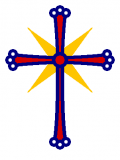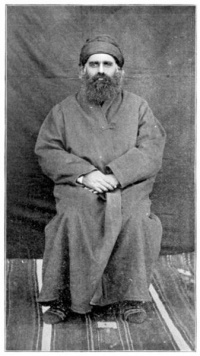Mar Addaıjan II
| Part of the series on Church of the East |

|
| Association |
| Communion of the Church of the East |
| Member Churches |
| Assyrian Church Borneian Church Religion of Light Chaldean Syrian Church Church of the East in Arakan, Burma and Tenasserim |
| Topics |
| Catholicos Assyrian Monasticism Assyrian Hospitals School of Samarqand Monastery of Mar Toma |
| People |

| |
| Title: | Metropolitan Archbishop of Samarqand |
| Dates: | 1- Mamır, Qaban jıl 1899 - 18- Qaņjar, Tüyü jıl 1932 (1st May 1899 - 18th Jan 1933) |
| Birth: | |
| Date: | 23- Tamuz, Ätiş jıl 1849 (23rd August 1849) |
| Place: | Şahrısabz, Turkestan |
| Death: | |
| Date: | 18- Qaņjar, Tüyü jıl 1932 (18th January 1933) |
| Place: | Samarqand, Turkestan |
| Relgious Affiliation: | Assyrian Church |
Biography
Mar Addaıjan II was the Assyrian Metropolitan of Samarqand in the run-up to the Basmaçı Revolt, and in the early period of Turkestani independence.
He was born Addaıjan Sabrışo, son of Tulmaı, in the city of Şahrısabz, in what is now the Province of Tajikistan in the year 1849. His father was one of a small number of ethnic Assyrians in the Turkestan area, and his mother was a Turkic Sart, both Assyrian Christians.
He entered the priesthood, and was consecrated as Bishop of his home city of Şahrısabz before he was 45. At the age of 50 he was raised to the ancient Metropolitanate of Samarqand, where he became involved with local education reform.
The practicalities of educating the local people brought him into contact with many of the young and radical Turkestani political activists and intellectuals, who formed the core of the Basmaçı independence movements. Mar Addaıjan II's keen sense of justice landed him in frequent hot water with the Tsarist Russian authorities, and when the Revolt eventually broke out in 1916, the 67-year-old Metropolitan found himself the de facto leader of a wide-ranging faction that took its inspiration from his previous struggles on behalf of the local people.
Assyrian Christians claim that it was Mar Addaıjan's doing to bring himself and the Muslim Mahmud Ğulam Xan, Emir of Buxara into association, though Muslims dispute this version of events.
Despite his lack of training in warfare, his forces proved to be some of the most uncannily effective; Mar Addaıjan seemed to have a talent for acquiring gifted subordinates, and the actual leader of "his" army, Eldos of Karmana, was no exception. Eldos, in fact seems to have been one of the most talented strategic commanders the Basmaçı had, up to and possibly including Ibrahim Enver. Eldos, though, did not have the ability to unify opposition to Russian rule that either Mar Addaıjan or Enver had.
Following the establishment of the State of Turkestan, Mar Addaıjan II became part of the Qurultaı, and became a sometimes lone voice of mercy for the few Russians choosing to remain in the country; standing for justice, just as he had done before.
He died in 1933 at the age of 84, and his tomb on the outskirts of Samarqand became a focal point for Assyrian pilgrims and nationalistic feeling. Even the Russian-loving Snorist Government of National Unity seemed to like Mar Addaıjan II; his search for justice for both Turkestanis and Russians played very well for propaganda purposes.
More recently, historians have begun to re-examine this important Turkestani historical figure and to sift through the propaganda to find the real man beneath.
The difficulties in really accessing this giant of Turkestani history, though, are many; Mar Addaıjan II has been claimed by so many groups for their own propaganda purposes that getting at the real facts is not easy.
